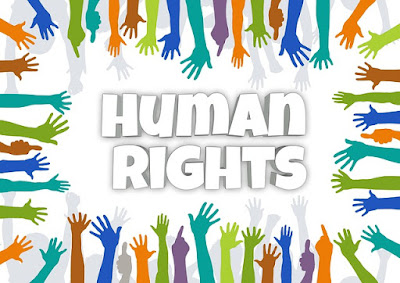Human Rights
Meaning and Definition:-
Human beings are rational beings.They by virtue of their being human,possess certain basic and inalienable rights which are commonly known as human rights.
Since these rights belong to them because of their very existence,they become operative with their birth. Human rights being the birth right,are,therefore inherent in all individuals irrespective of their caste, creed,religion,sex, and nationality.
These rights are essential for all the individuals as they are consonant with their freedom and dignity and are conducive to physical,moral,social and spiritual growth. They are also necessary as they provide suitable condition for the material and moral upliftment of the people.
Human right is a generic term and it embraces civil rights, civil liberties and social, economic and cultural rights. It is therefore difficult to give a precise definition of the term human rights.
Professor D.D.Basu defines human rights as, those minimum rights which every individual must have against the State or other public authority by virtue of his being a member of human family, irrespective of any other considerations
According to Universal Declaration of Human Rights, the expression ' human rights' denotes all those rights which are inherent in in our nature and without which we cannot live as human beings.
Justice P.N.Bhagwati in Maneka Gandhi vs Union of India, has defined the term human rights as, all those rights which are essential for the protection and maintenance of dignity of individuals and create conditions in which every human being can develop his personality to the fullest possible extents may be termed as human rights.
Human rights are therefore those rights which belongs to an individual as a consequence of being human as a means to human dignity. Those are the rights which all men everywhere at all times ought to have, something of which no one may be deprived without a great affront to Justice
As it exist today human rights are also known as Fundamental Rights, or Basic
Rights, or National Rights, or Common Rights that are the rights guaranteed to the people as individual, group or categories to live a decent and dignified life.
For the first time the term Human Right was used in the U.S. Declaration of
Independence in 1776 as: “that all men are created equal, that they are endowed by creator certain inalienable rights that amongst those are life, liberty and pursuit of happiness”
The French Declaration of Rights of Men and Citizen in 1789 states as: “The aim of
every political association is the preservation of natural and inalienable rights of men; these rights are liberty, property, security and resistance to oppressions.”
The first documentary use of the expression Human Right is to be found in the charter
of United Nations which was adopted at San Francisco on June 25, 1945. The first concrete step by way of formulating various human rights was taken by the United General Assembly in December 1948 by adopting Universal Declaration of Human Rights.
References:-
H.O.Agarwal,Human Rights
S.K.Kapoor, Human Rights
Since these rights belong to them because of their very existence,they become operative with their birth. Human rights being the birth right,are,therefore inherent in all individuals irrespective of their caste, creed,religion,sex, and nationality.
These rights are essential for all the individuals as they are consonant with their freedom and dignity and are conducive to physical,moral,social and spiritual growth. They are also necessary as they provide suitable condition for the material and moral upliftment of the people.
Human right is a generic term and it embraces civil rights, civil liberties and social, economic and cultural rights. It is therefore difficult to give a precise definition of the term human rights.
Professor D.D.Basu defines human rights as, those minimum rights which every individual must have against the State or other public authority by virtue of his being a member of human family, irrespective of any other considerations
According to Universal Declaration of Human Rights, the expression ' human rights' denotes all those rights which are inherent in in our nature and without which we cannot live as human beings.
Justice P.N.Bhagwati in Maneka Gandhi vs Union of India, has defined the term human rights as, all those rights which are essential for the protection and maintenance of dignity of individuals and create conditions in which every human being can develop his personality to the fullest possible extents may be termed as human rights.
Human rights are therefore those rights which belongs to an individual as a consequence of being human as a means to human dignity. Those are the rights which all men everywhere at all times ought to have, something of which no one may be deprived without a great affront to Justice
As it exist today human rights are also known as Fundamental Rights, or Basic
Rights, or National Rights, or Common Rights that are the rights guaranteed to the people as individual, group or categories to live a decent and dignified life.
For the first time the term Human Right was used in the U.S. Declaration of
Independence in 1776 as: “that all men are created equal, that they are endowed by creator certain inalienable rights that amongst those are life, liberty and pursuit of happiness”
The French Declaration of Rights of Men and Citizen in 1789 states as: “The aim of
every political association is the preservation of natural and inalienable rights of men; these rights are liberty, property, security and resistance to oppressions.”
The first documentary use of the expression Human Right is to be found in the charter
of United Nations which was adopted at San Francisco on June 25, 1945. The first concrete step by way of formulating various human rights was taken by the United General Assembly in December 1948 by adopting Universal Declaration of Human Rights.
References:-
H.O.Agarwal,Human Rights
S.K.Kapoor, Human Rights




